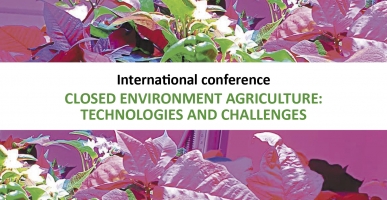Events
CLOSED ENVIRONMENT AGRICULTURE: TECHNOLOGIES AND CHALLENGES
23 11 2023
Resolution, adopted by the participants of the international conference
CLOSED ENVIRONMENT AGRICULTURE: TECHNOLOGIES AND CHALLENGES,
held at the Lithuanian Academy of Sciences on 14–15 November 2023
To:
Committee on Rural Affairs of the Seimas of the Republic of Lithuania
Ministry of Agriculture of the Republic of Lithuania
Ministry of Environment of the Republic of Lithuania
Lithuanian Vegetable Producers Association
Representatives from science, studies, and government institutions and from businesses, farmers’ and public organisations gathered at the international conference organised on 14–15 November 2023 by the Lithuanian Academy of Sciences and attended by high-level scientists and technologists from Lithuania, the Netherlands, Hungary, and Germany to discuss advances in indoor agriculture technologies as well as its challenges and their solutions. The participants in the conference discussed secondary use of raw plant materials, sustainable ways of increasing disease resistance in plants, the potential of photovoltaic technologies for horticulture, the development of water-saving aeroponic systems, and examples of regenerative agriculture practices in Europe, the Middle East, and Africa.
Recognising the importance of the challenges to be solved, the participants in the conference draw the attention of the responsible public authorities and the subjects of indoor agriculture to the following:
• Proper management of the parameters of the controlled environment in closed systems can result in maximum light energy efficiency. Biological and technological efficiency of energy use can be increased by selecting species-specific combinations of light intensity and duration. By controlling the spectrum of light, the duration of the plant development cycle can be significantly reduced.
• In order to achieve a sustainable agricultural model, it is necessary to develop easily degradable or recyclable substrates from renewable sources. Substrates currently used in agriculture are non-recyclable and contribute to climate change as their extraction is destroying ecosystems and consuming energy.
• To provide the consumer with agricultural produce of higher added value, it is important to broaden its diversity. The following plants are proposed to be included in the range of indoor agriculture: Amaranthus tricolor (Chinese spinach), Perilla frutescens (Beefsteak plant), Sanguisorba minor (Salad burnet), Basella alba (Malabar spinach), Mesembryanthemum crystallinum (Crystalline iceplant), Portulaca oleracea (Common purslane), and Plantago coronopus (Buck’s-horn plantain).
• Controlled environment agriculture requires strategies to reduce the use of agrochemicals. Adjusting macro- and micronutrients in the nutrient solution can improve the resistance of the cultivated plants to pathogens.
• To encourage the development of modern indoor agriculture, preferential treatment should be given to energy and material resources.
Addressing these issues and applying the results obtained will manifestly contribute to the development of indoor agricultural technologies and consumer education as well as raise awareness of the principles of healthy and nutritious diets, the importance of climate change, and the promotion of sustainable choices.
Jūras Banys, President of the Lithuanian Academy of Sciences
Vidmantas Stanys, Chair of the Division of Agricultural and Forestry Sciences of the Lithuanian Academy of Sciences
Translated by Diana Barnard
